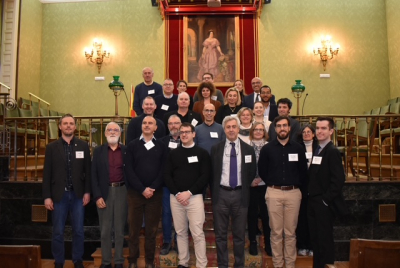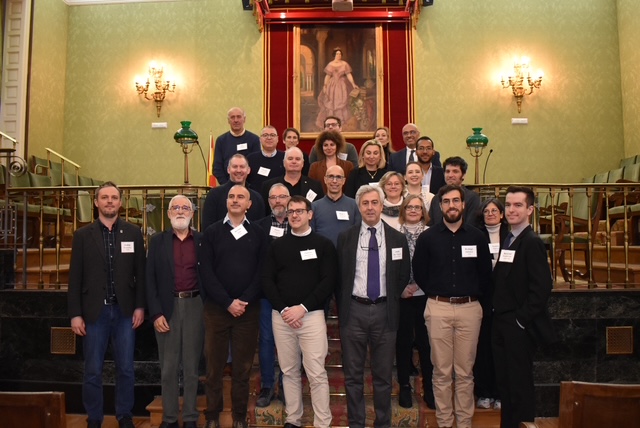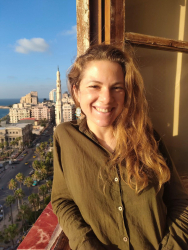


The IAP in collaboration with the Royal Spanish Academy of Sciences (RAC), and with support from the U.S. National Academies of Sciences, Engineering, and Medicine, organized an international workshop in Madrid to advance research and policy solutions on wildfire risk assessment, modelling, and the role of artificial intelligence (AI) in understanding vulnerabilities of communities. The event, held on 17-18 March, was hosted by RAC and brought together 26 experts from 10 countries and the European Commission.
The workshop examined how climate change, land-use changes, and urban expansion are increasing wildfire risks. Participants explored AI-driven modelling techniques and interdisciplinary strategies to improve fire management and community resilience.
IAP played a central role in shaping the workshop’s agenda, ensuring a multidisciplinary approach that bridges science, policy, and technology. Rania Kosti, IAP Executive Director, emphasized the importance of international collaboration and knowledge-sharing in her opening remarks.
"This workshop reflects IAP’s commitment to fostering evidence-based solutions through global scientific cooperation. By bringing together leading researchers from different parts of the world, we aim to develop data-driven strategies that enhance wildfire risk assessment and mitigation," Kosti stated.
RAC President Ana Crespo acknowledged IAP’s contribution, noting the vital role of scientific institutions in addressing global challenges.
The workshop featured four thematic sessions covering different aspects of wildfire risk assessment and modelling:
Among the highlighted presentations, Hussam Mahmoud (Colorado State University, USA) presented an asynchronous graph model for simulating built environment damage in the wildland urban interface, while José M. Moreno (RAC) provided insights into wildfire risks in rural Spain. Other key contributions included AI-driven urban vulnerability analysis by Paolo Fiorucci (CIMA Research Foundation, Italy) and a case study on Portugal’s national fire prevention strategy by Yannick Le Page (Portuguese Integrated Rural Fire Management Agency).

Recent wildfires – such as the January 2025 Los Angeles fire that destroyed 16,000 homes and caused 29 fatalities – underscore the urgency of improving risk assessment. As highlighted in a report by Spanish news agency Servimedia, experts at the workshop emphasized that AI can play a critical role in identifying fire-prone urban structures and improving emergency planning.
Moreno also noted that wildfire management requires a combination of early warning systems, urban planning adjustments, and advanced modelling techniques.
The workshop concluded with a call for sustained collaboration between scientists, policymakers and local authorities. Participants agreed that integrating AI with traditional fire modelling approaches can significantly enhance preparedness and response capabilities.
Ourania Kosti - Opening Remarks
Hussam Mahmoud - Workshop Goals
Jesus San Miguel - Perspectives on wildfire early warning
Ilkay Altintas - Right Model, Right Data, Right Time
Jose Moreno - Wildfires in the rural environment of Spain
Craig Weinschenk - Using Fire Dynamics Simulator
Eric Maillé - Fire behaviour and Multicriteria assessment
Eulalia Planas - Assessing dwelling vulnerabilities with CFD simulations
Jason Sharples - Dynamic fire propagation
Savvas Gkantonas - A new granular and scalable model for stochastic WUI fire spread behaviour
Hussam Mahmood - An asynchronous graph model for simulating built environment damage
Andres Valencia - Modelling wildfire impacts on cities
Marisa Chas-Amil - Socioeconomic analysis of the wildland-urban interface
Elsa Pastor - Evaluating wildfire vulnerability of dwelling using fuzzy logic and expert judgment approaches
Michele Salis - Application of wildfire spread modeling to quantify wildfire impacts at WUIs
Yannick LePage - Implementing low-complexity risk-assessment models
Rodrigo Mahaluf - Advanced Analytics Tools for the Protection of Wildland-Urban Interface Against Wildfires
Paolo Fiorucci - Can AI Enhance Wildfire Risk Awareness?
Read and download the full workshop agenda here.
For more details on IAP’s work in disaster risk reduction read here.
